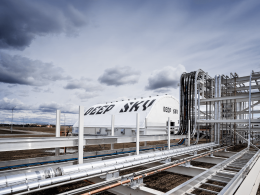French oil giant TotalEnergies has forecasted that global oil demand will peak after 2030 under its two main energy transition scenarios, neither of which meets the Paris Agreement’s target to limit global warming to 2 degrees Celsius, according to its latest energy outlook report. This projection is driven by factors like population growth, limited investments in power grids, and slower electric vehicle adoption, said Aurelien Hamelle, the company’s Sustainability and Strategy Director.
Currently, around 4.5 billion people lack sufficient energy access, especially in the global south, Hamelle noted, emphasizing that the anticipated population growth to 2050 would require a fourfold increase in energy production to alleviate energy poverty.
The report presents three scenarios: one based on current trends, a “momentum” scenario with moderate climate ambitions, and a “rupture” scenario aligned with Paris targets. Under the momentum scenario, TotalEnergies anticipates oil demand will peak slightly after 2030 and fall to 70 million barrels per day by 2050. However, the Paris-aligned pathway would require demand to peak before 2030, dropping to 44 million barrels per day by mid-century.
Despite these projections, Hamelle defended TotalEnergies’ continued oil and gas exploration, citing an annual 4% decline in existing fields that necessitates new investments to maintain current production levels. Projects with a final investment decision are seen as relevant even with increased climate action, he added.
TotalEnergies advocates for rapid deployment of mature, low-cost technologies like renewables, gas-fired power plants, and residential heat pumps. It anticipates significant adoption of carbon capture, hydrogen fuel cells, and e-fuels later in the 2030s and 2040s, with the United States expected to lead the global energy transition, while China plays a key role in accelerating it.
Meanwhile, the report highlights that China and India continue to expand coal-fired power plants, with one-third of these facilities projected to still operate in 2050.

















